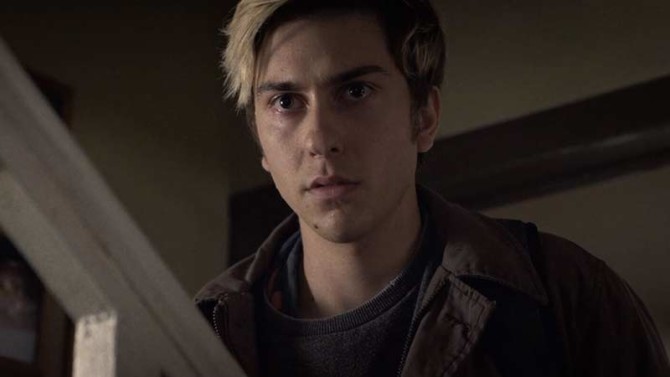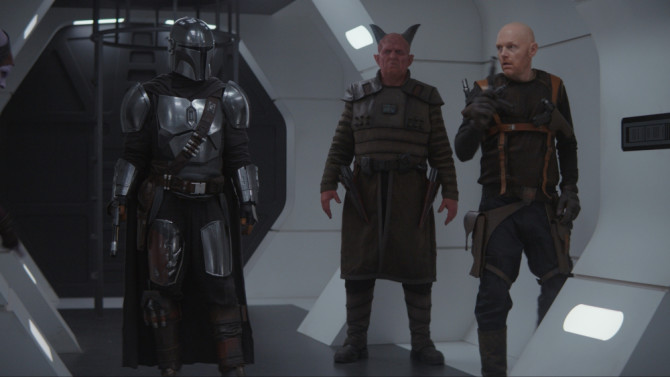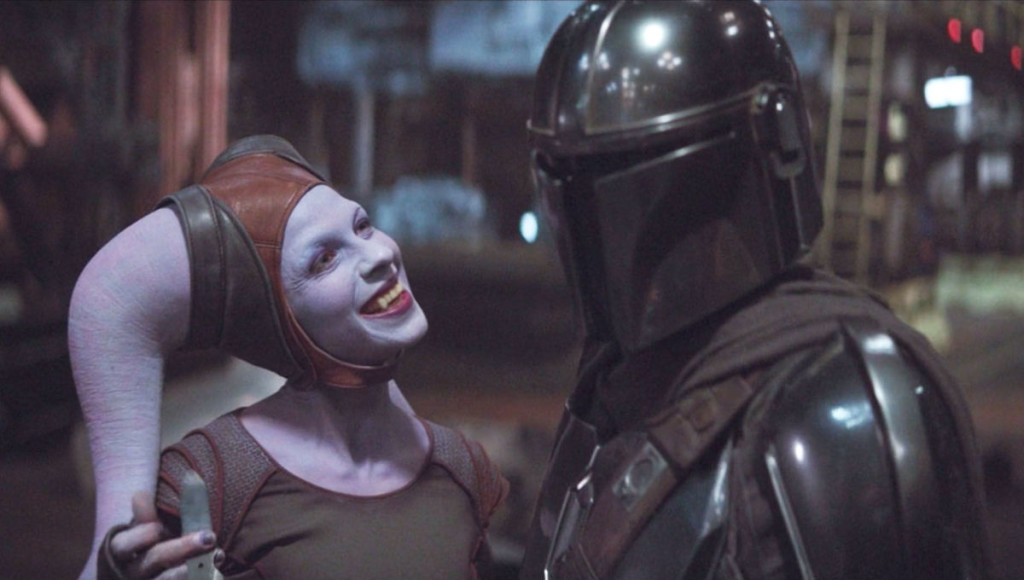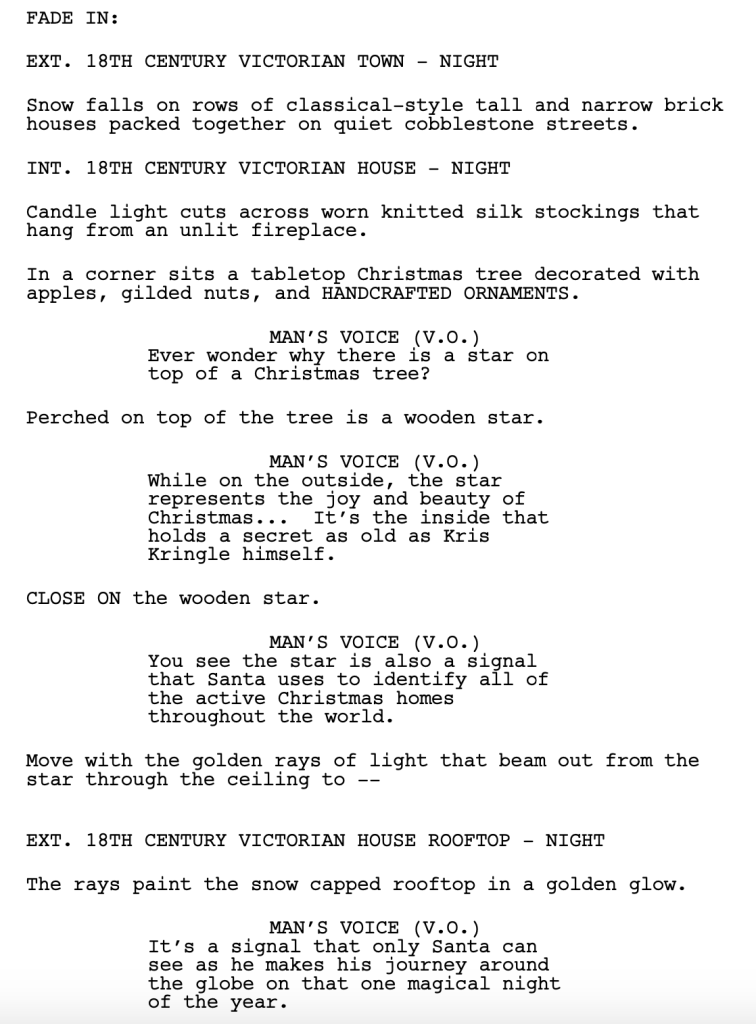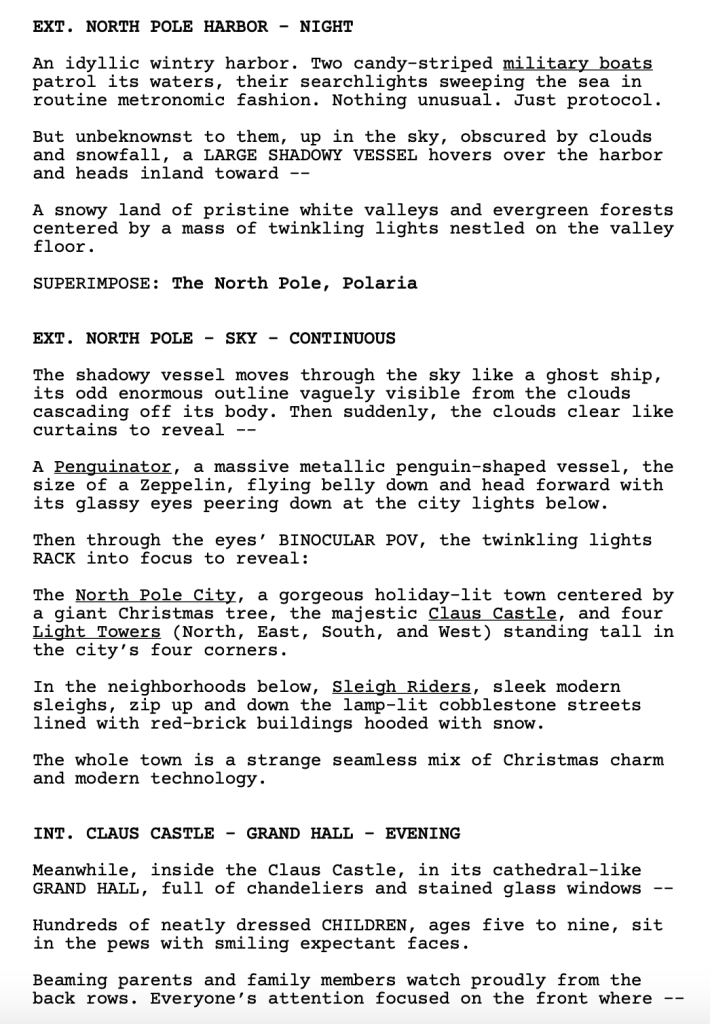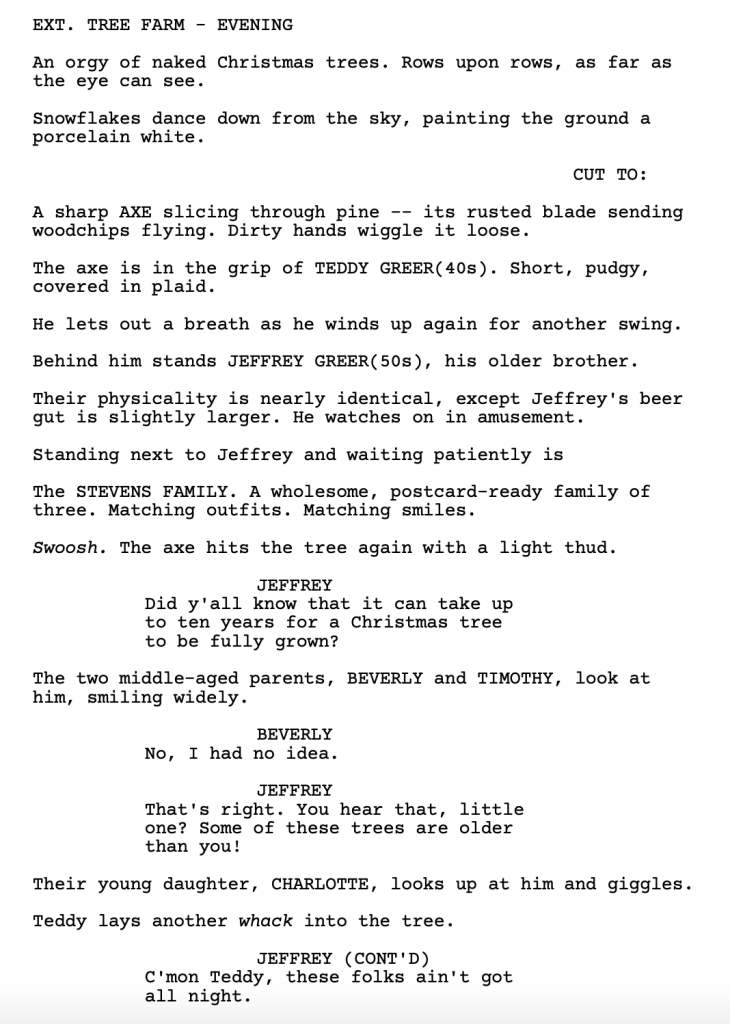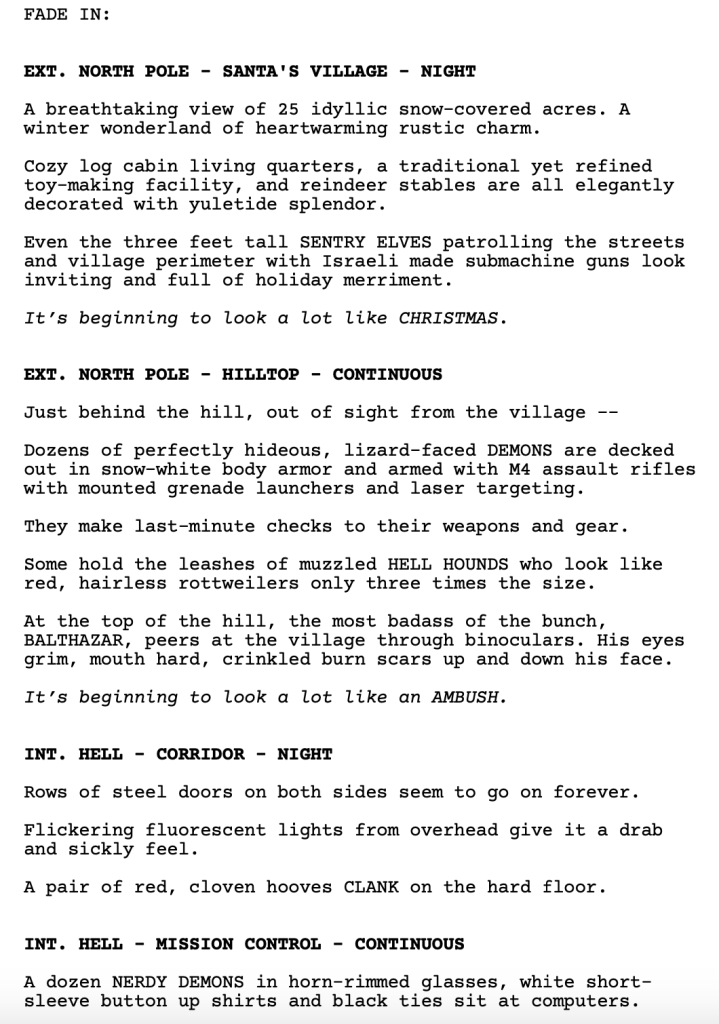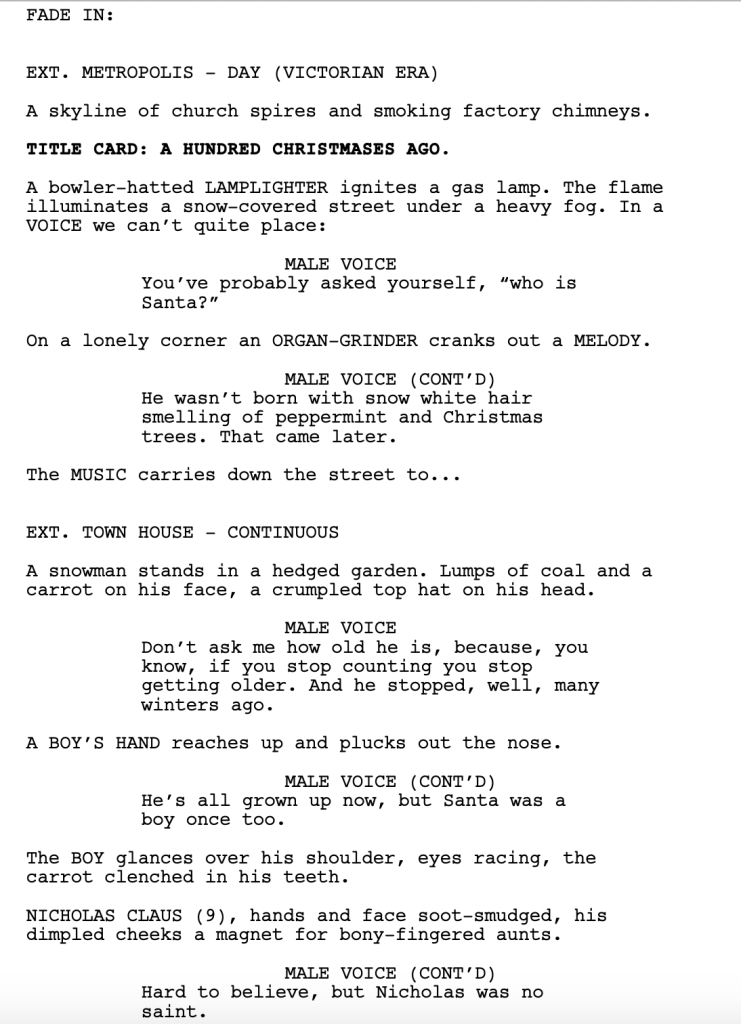Genre: Sci-fi/Rom-Com/Drama
Premise: Teddy thinks he’s the only living person left in a world where humanity is frozen in time… until his ex-girlfriend, Leyna, shows up at his doorstep. Together, they must go on a journey to find the cause behind the freeze and in the process, confront the issues that plagued their relationship before it’s too late.
About: This is the number 1 script on the 2019 Black List. The writer, Ken Kobayashi, graduated from USC Film School. This project is set up at Sony with Will Gluck producing. Gluck is no stranger to championing breakout scripts. He directed Easy A, one of the biggest spec scripts of 2009.
Writer: Ken Kobayashi
Details: 104 pages
Late last night, someone posted a comment regarding the low vote count for this year’s Black List. Writers don’t have agents this year, they reminded me. Duh! How could I forget?? And agents are the ones doing the heavy lobbying to get their clients on the Black List.
But it goes deeper than that. Yesterday, I championed the death of the biopic, as the dreaded genre was practically absent from the 2019 Black List. But now I realize that was almost certainly because the big agencies weren’t involved. Agencies promote projects for their talent arms, and biopics are actor favorites, since the actors get to play famous flawed figures and those movies always get Oscar noms. Once you remove the main people incentivized to promote that genre, however, you’re not going to have as many of them on list.
Which means maybe biopics aren’t dead after all. :(
This would also explain the uptick of original concepts in this year’s list. Managers are more willing to take chances on and develop original projects and they’re now the primary lobbyers. It’s a reminder that these things are never black and white. You take away one variable for a list and there might be 20 scripts out and 20 new scripts in. I suppose we’re going to find out if this change results in a better list or not. And it starts today with the top screenplay, Move On.
28 year-old Teddy has just asked his girlfriend, Leyna, to marry him. Leyna doesn’t mince words with her response. “No,” she says, and walks out the door. Teddy is devastated, lamenting to his best bud, Squid, who came to cheerlead, that nothing matters anymore. On his drive home, he tries to call Leyla but gets clipped by a truck, nearly dying. But it gets worse. A few minutes later, the entire world freezes.
Cut to three months later and Teddy is biking around a frozen world. Some things still work, like hot water and all the food stays fresh (since it’s frozen in the moment) but other than that, being alone in the world blows. But on his way home from biking, Teddy sees an impossible sight. It’s Leyna! She’s unfrozen as well!
She pops into his place and the two lament the situation they’re in. For some reason, they don’t discuss her marriage rejection. They hang out and the next morning Teddy shows her a google map of this giant black line off the west coast. He saw a black wall in person off the east coast and he wants to see if this other black line is also a wall. So the two go on a road trip together to find out.
During the trip, we occasionally cut back in time to the two meeting, getting to know each other, and starting their adult lives — all the things that led up to the proposal. What we learn is that Ted’s a moron. He took a job in Japan without clearing it with Leyla and then tried to save face by proposing to her. It turns out that rejection is the least of his worries, though, as Ted is about to find out the shocking reason why the world is frozen.
I saw a lot of people commenting on “Move On” in the comments yesterday and the consensus seemed to be that nobody made it past the first 20 pages. I can see why. The writing here doesn’t crackle loud enough to inspire that page-turning tick all writers strive for.
So what would’ve happened had you kept reading? Well, the script has a nice twist. There’s no doubt about it. And that led to an interesting final act. But before we get to that, let’s talk about everything else.
There were too many small but frustrating miscalculations in Move On to buy into it. For example, we get hit with the most gigantic story development ever. THE WORLD IS FROZEN. That’s something you need to sit in for a while. It’s not something you flippantly throw in before sprinting to the next plot point. But that’s exactly what happens. Less than ONE PAGE after the world freezes, Teddy sees Leyla. I knew at that moment the script was in trouble.
Understanding time and pacing and when to draw things out and when to move things along is an essential skill in screenwriting. Some writers do it naturally. For others, it takes time to learn. But, I mean, one page of Frozenville and we’re already throwing the girlfriend back in there?
Then, our lead characters aren’t acting like real people would. If two people lived in a frozen world for three months then ran into each other, it doesn’t matter who they are, they would spend the next 48 hours talking about this bizarre event and how it’s changed their lives and how scared they were and everything they saw and experienced. Instead, we get a brief conversation between Teddy and Leyla before she says, “We’ll continue this conversation tomorrow.”
The trifecta for me was when Teddy says he’s found this black line on the West Coast on Google Maps. He’s already been to the East Coast and seen a black wall off the beach. So he wants to “check to see” if this line is also a black wall. Here’s your answer, Teddy. Yes. Yes it is. What else would it possibly be? Yet that’s the goal we use to drive the story. At that point, I mentally gave up on the script and only read on because I was going to review it.
To the writer’s credit, we do get that twist. —SPOILERS— It turns out that on his way home that day, Teddy didn’t get clipped by a truck. He got flat-out T-boned and was killed. This is a simulation (both the world and Teddy) for people who need to find closure with those who they’ve lost. Leyla was devastated because she never got to discuss what happened and why she did what she did. So, five years later, she’s finally gotten a chance to get that closure.
I’ve read a lot of scripts where people are in simulations. I’ve even read a good number of scripts where people create simulations to connect with dead loved ones. But I’ve never read a script where we take the point of view of the simulated dead person inside the simulation.
It just goes to show how powerful POV can be in story creation. If you’ve been doing this long enough, you’ve come up with a hundred concepts, many of them discarded because they were too similar to other movies. But what if you changed the obvious POV to a non-obvious one? For example, everyone’s come up with a Die Hard idea. But what if you wrote a Die Hard idea from the point of view of Hans? The villain? It would be a completely different movie (I’m not saying it would be good – I’m talking off the top of my head here – but it would be different). So I give credit to Kobayashi for finding a cool angle that no one else thought of. I’m guessing that’s why he made this year’s list.
Unfortunately, the script wasn’t up to snuff in many other areas. I loved the twist. And I even liked the dark tone the script shifted to in those last 20 pages. But then you have stuff like Teddy learning he’s a simulation and, within one scene, being okay with it, and then, in the next scene, cheerfully ready to be turned off for good. There were so many story beats like this one that lacked genuine human reactions that I was constantly being pulled out of the script.
But it does show you how powerful a big concept and a big twist can be. If you’re a young writer who’s a long ways away from mastering this skill, those two things can act as turbo boosters. Because both of them are memorable. You remember the concept. You remember the twist. In most cases of reading screenplays, you don’t remember anything about a script after a couple of weeks.
Move On is a fun screenplay when viewed in totality. But it’s an uphill battle getting to the twist that saves it. It wasn’t enough for me to recommend the screenplay.
[ ] What the hell did I just read?
[x] wasn’t for me
[ ] worth the read
[ ] impressive
[ ] genius
What I learned: Screenplays where a character acts bizarre for reasons that aren’t revealed until late in the story are hard to pull off. Once we hit the twist on page 70, we get a better understanding of why Leyla is acting so strangely (why she just conveniently appeared out of nowhere and why she’s so laid back in spite of the outrageous circumstances). This is her simulation. She doesn’t have to talk or answer anything from Teddy if she doesn’t want to. She just wants to spend time with him to get closure. Think about what you’re doing to the reader here, though. You’re having a character act unlike any rational human being would for 70 pages before you tell them why. It’s not that you can’t pull this off. But you have to creatively find ways to make the character feel real in the meantime. Or else the reader sees this character who’s doing all these things that no normal person would do and they give up on the script before they get to the great twist. So travel down this road cautiously.
Reminder that CONTAINED THRILLER SHOWDOWN – a script competition for contained thrillers (action, sci-fi, horror, dramatic, all okay) – is set for January 17th. Submissions are due Thursday, January 16th, by 8pm Pacific Time. Send a PDF of the script to carsonreeves3@gmail.com. Include your title, genre, logline, and why you think the script should get a shot. The best five entries will be posted for the showdown!
It’s a crazy day. The Black List is out. Or, at least, it’s being dripped out on Twitter. Maybe someone can post the list when they’re finished because I have to run around town today. Any concepts that catch your interest? Share them below. We’ve also got the big Rise of Skywalker premiere. That means we’re going to know REALLY SOON whether this movie is good or not. If we get a lot of those tweets that *sound* excited but the content of the tweet doesn’t say the actual movie is good (“This is the most real Star Wars movie of the last few years!” “JJ brought some amazing direction to this last film!” And my personal fave: “You’re going to love Rey. She kicks all types of a$$ in this movie!!!”) then our hopes for a good Star Wars film are over. Oh yeah, this post isn’t about Star Wars. Thoughts on the Black List. Leave them below!
EDIT! (LIST PRINTED BELOW)
People have been curious about the low vote count for the top 10 scripts. I think that’s because there’s no runaway great script this year. My first impression is that this feels like a return to form for the Black List. Lots more original ideas than in years past. Less of the most unoriginal genre out there – the biopic – helps a lot. The Traveler did, indeed, make the top 5, like I predicted. The Menu up there as well! Two great scripts.
“Move On” winning the top slot is bittersweet. I gave notes to a writer 8 years ago who had this exact same concept. I kept telling him, “This is a slam dunk! Keep working on it!” I think he just wasn’t into it enough to give it those extra 3-4 drafts that it needed. This is something all screenwriters deal with. How much of yourself do you have to give to a script? Because great scripts tend to require everything we’ve got. You have to be ready to do that hard work on those final three drafts where you hate your script more than anything because you’ve been living in it for so long. But that extra work ends up paying off in the end.
Just to remind everyone, these are AGENT AND MANAGER LOGLINES. Agents and managers aren’t writers. Some of them understand logline writing better than others. But don’t judge these loglines on their construction because, besides a few exceptions, these aren’t writers writing them.
29 votes
Title: Move On
Writer: Ken Kobayashi
Logline: Teddy thinks he’s the only living person left in a world where humanity is frozen in time… until his ex-girlfriend, Leyna, shows up at his doorstep. Together, they must go on a journey to find the cause behind the freeze and in the process, confront the issues that plagued their relationship before it’s too late.
20 votes
Title: Field of View
Writers; Reiss Clauson-Wolf, Julian Silver
Logline: A soldier, forced to relive her worst day in combat, begins to question her sanity when the VR simulation she’s experiencing doesn’t match her memory of the mission gone wrong.
19 votes
Title: Don’t Worry Darling (read my review!)
Writers: Cary Van Dyke, Shane Van Dyke
Logline: A psychological thriller about a 1950s housewife whose reality begins to crack, revealing a disturbing truth underneath.
16 votes
Title: Cicada by Lillian Yu
Writer: Lillian Yu
Logline: When a talented hacker is recruited by the mysterious Cicada 3301, she gets wrapped up in a plot that threatens to destroy the entire world. Based on the real organization.
Title: The Traveler (read my review!)
Writer: Austin Everett
Logline: A man jumps forward in time at the same time every morning. As the length of time increases for every jump, he struggles to keep his family together and find a cure, all as his secret spreads throughout the world. Based on the novel by Joseph Eckert.
Title: The Unbearable Weight of Massive Talent
Writers: Kevin Etten, Tom Gormican
Logline: Actor Nicolas Cage, spiraling and trapped in debt, makes an appearance at the birthday party of a Mexican billionaire. While there, he learns that the billionaire runs a drug cartel, and the CIA recruits Cage for intelligence.
15 Votes
Title: Rumours
Writers: Tyler Austin, Patrick Eme
Logline: In 1970s LA, Stevie Nicks and Lindsey Buckingham, two struggling musicians and lovers, join a band called Fleetwood Mac and are thrown into a whirlwind of worldwide fame, infamous drug addiction, and one of the best-selling albums of all time — which also happens to be about the disintegration of their relationship.
14 Votes
Title: A Magical Place Called Glendale
Writer: Sara Monge
Logline: To revamp her self image, an arrogant but well-meaning high school socialite decides to help a former friend land the guy of her dreams… but in the process, realizes she wants her for herself.
Title: Shut In
Writer: Melanie Toast
Logline: A single mother is held captive by her violent ex, and her two young children are left at risk. She must do everything to protect them and survive.
13 Votes
Title: The Broker
Writer: Justin Piasecki
Logline: A fixer who brokers off-the-books exchanges for powerful corporate clients finds himself being hunted after he’s hired to protect a whistleblower and the evidence she’s uncovered.
Title: Pod
Writer: Nabil Chowdary
Logline: After a mission to destroy a black hole that endangers mankind goes wrong, an astronaut awakens in her escape pod to find that decades have passed seemingly in a moment. Now, with an old body and fragile mind, she battles against the elements of space & time to complete her mission.
Title: Wayward
Writer: Andrew Zilch
Logline: The wife of a megachurch pastor seeks atonement after she and her lover kill an attacker in self-defense, but don’t report it out of fear of exposing their affair.
12 Votes
Title: Grandma Wants to Die by Patrick Cadigan
Logline: When Ben is left footing the bill for his own wedding just weeks before the big day, he’s forced to make a deal with his estranged grandmother Minnie. She’ll give him the money if he signs the papers for her assisted suicide. Ben gladly agrees, only to unearth Minnie’s final agenda before she departs… destroy the wedding from the inside and seemingly ruin Ben’s life.
Title: I Heart Murder
Writer: Tom O’Donnell
Logline: A true-crime podcaster tries to solve a gruesome cold case, putting her in the killer’s crosshairs.
11 Votes
Title: 8 Bit Christmas by Kevin Jakubowski
Logline: Ten-year-old Jake Doyles goes on a herculean quest to get the Christmas gift of his generation – a Nintendo Entertainment System – in suburban Chicago in the late 1980s.
10 Votes
Title: Black Mitzvah
Writer: Lauren Tyler
Logline: After embarrassing herself at the most popular girl’s party, a black and Jewish middle school misfit embarks on a journey to glow up and throw the best Bat Mitzvah of all time.
Title: The House Is Not For Sale
Writer: Roy Parker
Logline: With one last chance at a promotion, a down-on-her-luck real estate agent returns to her rural hometown to sell the impossible – a haunted house where countless couples have been murdered. As the bodies of new residents continue to pile up, our real estate agent will stop at nothing to rid the house of evil – no matter what the cost.
Title: Klein
Writer: Derek Elliott
Logline: Life as a single dad hasn’t been a challenge for Las Vegas blackjack dealer Mike Klein, until his ex resurfaces after walking out on the family six years ago.
Title: The Menu (read my review!)
Writer: Seth Reiss, Will Tracy
Logline: A young couple visits an exclusive destination restaurant on a remote island where the acclaimed chef has prepared a lavish tasting menu, along with some shocking surprises.
Title: The Process
Writer: Levin Menekse
Logline: Trapped at a three day personal development retreat, a woman fights to save her husband and herself from being brainwashed by a charismatic self-help guru.
Title: Refuge
Writer: Debra Moore Munoz
Logline: A brother and sister navigate the perils of both man and nature through Central America in their quest to find safety in the United States.
Title: Ripple
Writer: Ezra Herz
Logline: After strange deaths and suicides skyrocket in a dying Appalachian coal town, Maggie – a first responder – wages a personal war against the local coal mine, unearthing a disturbing past that the company has kept secret within the waters of the local lake.
Title: They Cloned Tyrone
Writer: Tony Rettenmaier, Juel Taylor
Logline: An unlikely group is thrown together by mysterious events that leads them to uncover a government conspiracy.
9 Votes
Title: Breathe
Writer: Doug Simon
Logline: In the near future when air-supply is scarce, a mother and daughter fight for survival when two strangers arrive desperate for an oxygenized safe haven.
Title: Dollhouse
Writer: Michael Paisley
Logline: When a struggling fashion model in New York City gets chosen by a mysterious Parisian designer to be the face of his first campaign since his disappearance five years prior, she begins to realize she was chosen for a reason and must decide how much she’s willing to sacrifice for beauty and recognition.
Title: Helldiver
Writer: Ben Imperato
Logline: After finding themselves stranded on the wreckage of a Helldiver bomber in the middle of the ocean, an American aviator and a Japanese Kamikaze pilot must work together to survive their greatest threat yet — a 22-foot great white shark.
Title: High on Christmas
Writers: Hannah Mescon, Dreux Moreland
Logline: A stoner comedy about one family trying to save Christmas from itself after Santa eats the wrong batch of cookies.
Title: The Laborer
Writers: Jared Anderson
Logline: A pair of out-of-work immigrant brothers catch a break when they are hired as day laborers to work at a house in the Hollywood Hills, until they witness something they will wish they had never seen.
Title: Say Something Nice
Writer: Erin Rodman
Logline: After she catches her boyfriend cheating, Liv goes on a social media tirade that lands her in court for slander, and the judge forces her to make amends by composing one positive comment for every negative comment she posted, while under the supervision of a reclusive mediator also on the rebound from a failed relationship. Inspired by true events.
8 Votes
Title: Affairs of State
Writer: Pat Cunnane
Logline: A romantic comedy about an outgoing President, an incoming Prime Minister, and their second shot at love.
Title: An Aftermath
Writer: Lauren Caris Cohan
Logline: After a whirlwind lost-distance online romance, a once-cynical writer inherits a remote smart-house from her newly deceased new husband and discovers he might not be entirely gone after all.
Title: Apex
Writers: Aja Gabel, MJ Wesner
Logline: When old college friends on a trip to Mexico get trapped in an underwater cave system with a bull shark, old tensions and power struggles resurface as they fight to survive.
Title: Barron: A Tale of Love, Loss, & Legacy
Writer: Nicolas Curcio
Logline: Fearing the devastating impact that his father’s presidency would have on his personal life, his country, and the world at large, ten-year-old Barron Trump sets out to sabotage his father’s 2016 campaign.
Title: The Cabin at the End of the World
Writers: Steve Desmond and Michael Sherman
Logline: A gay couple and their adopted daughter have their cabin invaded by four strangers who take the family captive and tell them that, to prevent the upcoming apocalypse, one of them must be killed by the others.
Title: The Diamond as Big as the Ritz
Writer: Cody Behan
Logline: When the underprivileged John Unger is invited to spend the summer at the mansion of his peculiar classmate, his thirst for grandeur leads him down a dangerous exploration of greed, morality, and the secret horrors of the ruling class. Based on the F. Scott Fitzgerald short story.
Title: First Harvest (read my review!)
Writer: Kevin McMullin
Logline: George runs a struggling farm where he cares for his terminally ill wife, Alice. Everything changes when he decides to bring home an orphaned baby he found out in the field. The child’s presence begins to unearth buried secrets while engulfing the family in a series of supernatural events.
Title: My Boyfriend’s Wedding
Writer: Carrie Solomon
Logline: After Georgia accidentally receives an out of the blue invitation to her on-again, off-again boyfriend’s wedding, she and her best friend Keely make the ill-informed decision to attend.
Title: Resurrection
Writer: Andrew Semans
Logline: Margaret is a single mother living in New York with her teenage daughter. When David, a mysterious older man from Margaret’s past, begins appearing randomly in her environment, she becomes convinced that he intends to bring tremendous violence into their lives. So Margaret embarks on a vigilante mission to protect her daughter, and to disembowel David.
Title: The Searchers
Writer: MacMillan Hedges
Logline: An inside look at the unique relationship between John Wayne and John Ford on the set of THE SEARCHERS.
Title: Sister
Writer: Azia Squire
Logline: Following her mother’s sudden passing, a queer black woman returns to her southern town to assist her estranged sister plan the funeral. Her trip takes a turn when sleep deprivation manifests visions of her deceased mother.
Title: Super Dad
Writer: Sean Tidwell
Logline: A subversive superhero story about the world’s only superhero living a bachelor lifestyle, learning he has two very different teenage twins he never knew existed, and now has to figure out how to be a father.
Title: The Swells
Writer: Rachel James
Logline: A young woman, propelled by an unstoppable rage, begins inviting her victims to a summer lake house as revenge for past wrongs. But when one of her guests has been wronged as well, she passes on The Swells- bringing its wrath to the streets of New York.
7 Votes
Title: Betty Ford
Writers: Kas Graham, Rebecca Polack
Logline: An intimate portrait of the sensational First Lady and ERA champion, Betty Ford, as she challenges, scandalizes, dances and drinks her way through the White House to gain a higher popularity rating than any President in American history, all whilst maintaining a 26 pill-a-day drug habit.
Title: Doll Wars
Writer: Matt Ritter
Logline: When the upstart Bratz dolls challenged Barbie’s antiquated gender norms and threatened their monopoly, Barbie struck back with a billion-dollar copyright lawsuit. In jeopardy of shutting down, Bratz turned to a small, scrappy, all-female law firm to take on Mattel in a historic, David vs. Goliath intellectual property battle that changed the toy industry and American popular culture forever. Based on a true story.
Title: Don’t Go in the Water (read my review!)
Writer: Peter Gaffney
Logline: A recovering alcoholic sets off for seclusion but gets more than he bargained for when he encounters a mysterious creature nearby.
Title: First Ascent
Writer: Colin Bannon
Logline: Two years after a free solo accident nearly kills Hillary Hall, she enlists the help of her old climbing partners to document her comeback — the first ascent of 4,000 foot rock wall in rural China. During the harrowing climb, Hillary struggles with her inner demons and supernatural forces, as it slowly becomes clear that this mountain does not want to be conquered.
Title: The Man in the Woods
Writers: Darren Grodsky, Danny Jacobs
Logline: After moving to Maine and befriending an enigmatic hermit, twelve-year-old Henrietta Thorne begins to wonder if he holds the key to solving a mystery that has eluded our planet for more than a decade.
Title: The Perdition in Liege
Writer: Henry Dunham
Logline: A prisoner of war in a Belgian POW camp undergoing abandonment survives an execution firing squad by chance and escapes by hiding among the dead. After removing his fallen compatriot’s dog tags to get home and give their families solace, he attempts the fifty-mile journey south toward the allied stronghold, through the deadly war-torn landscape, and before a hell-bent SS officer on his tail catches up to him.
Title: The Repossession
Writer: Megan Amram
Logline: Twenty years after a failed exorcism, a meek young woman becomes unlikely friends with the foul-mouthed demon that possessed her as a child.
Title: 10-31 (read my review!)
Writers: Peter Gamble, Ian Shorr
Logline: A young woman takes her niece and nephew trick-or-treating and discovers a note inside a candy wrapper that says there’s a killer loose on her block.
6 Votes
Title: Apex (read my review!)
Writer: Stephen Vitale
Logline: A mysterious loner heads to Muscle Beach in 1985 to pursue a career as a competitive bodybuilder. Struggling to transform his physique, he unleashes a darker side of himself as he descends into madness.
Title: Assisted Living
Writer: Kay Oyegun
Logline: A thief finds sanctuary in a retirement home after going on the run.
Title: Atlanta Onfire
Writer: Adam Morrison
Logline: The true story of Leo Frank, a young, Jewish businessman who, due to widespread anti-Semitism/the KKK in the post Civil War South, was wrongfully accused, tried, and convicted of murdering a 13-year-old factory worker, Mary Phagan.
Title: Blue Slide Park
Writers: Kyle Anderson, Michael Vlamis
Logline: After his first album topped the Billboard Charts, life was never the same for Malcolm McCormick aka Mac Miller. This is his story of music, love, success, family, and addiction. Based on the forthcoming manuscript UNT. MAC MILLER BIOGRAPHY written by Paul Cantor for Abrams Press.
Title: Can You Tell Me How?
Writer: Gregory Bonsignore
Logline: Alarmed by the disproportionate dropout rates amongst children of the working class, a young female TV producer finds a way to teach them their ABCs and 123s. With the help of genius puppeteer Jim Henson and a diverse team of dedicated researchers and educators, they brought us the groundbreaking show, Sesame Street.
Title: Girlfriend on Mars
Writer: Kaitlin Fontana
Logline: Amber and Kevin, weed dealer burnouts committed to going nowhere together, have been dating for twelve years. When Amber enters a reality show that will take the winner to Mars with no chance of return, Kevin has to face what it really means when the ones we love leave us and leave the planet. Based on the story by Deborah Willis.
Title: Meet Cute
Writers: Chris Powers, Dan Powers
Logline: ‘Meet Cute’ the hottest dating app on the market, brings couples together by giving them their Rom Com moment. When the app’s biggest skeptic, Haley, matches with one of its developers, Russ, their instant connection starts to change her mind.
Title: The Mother
Writer: Michael Notarile
Logline: The incredible true story of Fredericka Marm Mandelbaum, who was the countrys first female mob boss. During the Gilded Age, Marm opened a school for criminals, and built her empire by treating her gang of runaways and orphans as family — eventually partnering with George Leslie to pull off what is still to date the largest bank heist in American history (adjusting for inflation).
Title: No Good Deed
Writer: Christina Pamies
Logline: A woman with a troubled past invites her teen niece to live with her in the family’s farm house, but the two become tormented by a creature that can take away their pain for a price.
Title: Nomads
Writer: Esteban Orozco
Logline: A reverse SEARCHERS from the perspective of the Natives going East into the unknown, the metropolis, the belly of the beast, late 1800s New York City.
Title: The Showrunner
Writer: Cosmo Carlson
Logline: The unbelievable true story of the creation of the worlds first, longest running, and most notorious reality show “COPS.” Based on “How ‘Cops’ Got Made — And What It Says About America” by Tim Stelloh.
Title: Stampede
Writer: Sontenish Myers
Logline: A young slave girl named Lena has telekinetic powers she cannot yet control on a plantation in the 1800s.
Title: T
Writer: Eric Gross
Logline: The true story of how Lawrence Tureaud, a poor kid in Chicago with 12 brothers and sisters, fought and charmed his way into becoming the single lettered icon of saintly compassion and macho energy.
Title: This Is Going to Hurt
Writer: Cameron Fay
Logline: An absent mother attempts to reconnect with her daughter by relaying to her how she helped her own parent through battles with cancer and addiction.
Title: Til Death
Writer: Jessica Knoll
Logline: Swept up in the excitement of her wedding day, Dr. Julie Wheeler is oblivious to the killer on her guest list, who is methodically stalking her nearest and dearest, until its too late.
Title: Voicemails for Isabelle
Writer: Leah McKendrick
Logline: A low-level TV writer struggles to cope with the death of her little sister by continuing to leave her voicemails chronicling the shitshow that is dating in LA. When the phone number is unknowingly transferred, a cocky New York real estate agent begins receiving the hilarious and confessional voicemails, and feels pulled to California to find this stranger he feels intimately close to.
Welcome to The Mandalorian Teleplay Chronicles. I will be reviewing every episode of The Mandalorian’s first season with an eye towards helping writers learn TV writing. Here’s a link to my review of the first episode here, a link to the second episode here, a link to episode 3, episode 4, and episode 5.
Genre: Sci-Fi Fantasy (Half-Hour Drama TV??)
Premise: This week, Mando teams up with four fellow bounty hunters to spring a prisoner from a prison ship. In the process he learns that they plan to leave him behind.
About: We are six episodes in. Before this episode, we had two good episodes and three bad ones. The good news is the Rick Famuyiwa, who directed my favorite episode of the series (Episode 2 – Jawa Adventure), is back in the director’s seat. This week, he’s also writing, which is good news if only because it means he’s taken Dave Filoni out of the mix. Famuyiwa is joined by Christopher Yost, who penned Thor Ragnarok. Heads up for Mandalorian fans. Next week’s episode comes out Wednesday. Then they’re off for a week. Then the final episode is on the Friday of the week after.
Writers: Rick Famuyiwa and Christopher Yost
Details: 40 minutes? 42 minutes? (the credits are 80 minutes long every episode so it’s hard to determine the actual run time of these things)
I’m done with this show.
I mean, I’ll watch and review the last two episodes. And I’m sure they’re going to add some cliffhanger at the end of the season (Boba Fett? Jabba the Hut’s son?) that will make me check out the first episode of Season 2. But after that, I’m done.
This is not what I was hoping for at all. I thought we were going to get an expansion of the Star Wars universe with new and fun interconnected storylines. Instead we get this cartoon format “adventure-of-the-week” b.s. Literally 99% of the people who watch this show want an interconnected story. But of course that’s not the way Lucasfilm operates. Give the fans what they want?? Hezell no, that would make sense. We’ll make the Star Wars we want to make and you’ll suffer for it.
Some of you may say that I’m just mad that they didn’t give me what I was expecting. No no no. They legit hoodwinked us. They introduced baby yoda and this mysterious cloning guy – implying that we were entering a larger season-long story. Now Baby Yoda is nothing more than a meme. His inclusion in each episode is a strain. He’s a plot point that needs a character to say “You stay here” for 30 minutes while the episode happens.
And Friday’s episode? Friday’s episode was not Star Wars. Friday’s episode was Deep Space Nine Wars. It was Star Trek, complete with bad make-up and awful acting (the devil guy and purple girl especially). That’s another thing. I never watched an episode of Game of Thrones and thought, “They skimped on money there.” Yet I was constantly annoyed by the cheap production value in this episode. They built the entire episode around a single freaking hallway! They built ONE HALLWAY and kept running around in it.
For those who didn’t see the episode, count yourselves lucky. It follows Mando as he reconnects with an old terrible actor who always seems to arrive on a show’s worst episode. I remember this actor when he appeared on Lost and screwed up a few episodes of that show. Anyway, he puts together a team for Mando to go break a prisoner out of a prison ship. The team consists of Bill Burr, Twi-Lick, Devil Man, and Zero Bot.
They infiltrate the ship, go break the guy out, and we learn that the prisoner is Man Twi-Lick, the Twi-Lick woman’s brother! Somehow Man Twi-Lick’s makeup is even worse than his sister’s. Then, wouldn’t you know it – they turn on Mandalorian! Locking him up. They *could* just leave, of course. But no, they hang around for a bit, allowing time for the Mandalorian to escape and then hunt them down one by one. The end.
Last week, in the comments, I was arguing with a reader about isolated episode TV versus storyline TV. My argument was you should write something that connects. Almost EVERY SINGLE SHOW on TV today has a through-line.
Why? Well, you have to remember why they did it differently back in the day. It was because there wasn’t a medium that allowed people to re-watch shows. The only time a show was on was when it came on TV. If you missed it, you missed it. TV execs back then were worried that if someone missed an episode and that episode was critical to understanding the show, then the next episode would be confusing, dissuading the viewer from watching future episodes. The solution was to make every episode its own isolated thing (this is why sitcoms used to be so huge – they were ideal for this format).
But then DVDs came along and people were buying entire seasons of shows and so it made sense to create more of a through-line from show to show. Then the game really changed when Lost came out. That was the first show where you had to watch every single episode to know what was going on. After that, the further advent of “watch a show whenever you want” occurred when streaming arriverd. Breaking Bad and Game of Thrones became mega-hits specifically because you had to watch every episode to find out what happened.
Long story short, making The Mandalorian an “every episode is a standalone episode” show makes no sense. ESPECIALLY because it’s Star Wars, the biggest fictional world ever created. Why are you doing this? It makes it feel like a Saturday Morning cartoon, which it ISN’T. It’s a live-action 20 million dollar an episode show. Not only that, the seasons are SHORT! You don’t have to come up with a 20 episode arc here. It’s just 8 episodes! You can’t connect 8 episodes??
It’s frustrating and it’s maddening and it’s sad. It’s sad because this show is going to die. Probably not this season. But next season for sure. It’s been exposed. Everybody who talks about it says the same thing. “Yeah it’s kind of good… um… but why aren’t the episodes longer and why isn’t the story connecting?”
And look, if every episode was actually good, we’d be having a different conversation. If you somehow made this archaic format work for the show, I’d be all for it. But this isn’t Saturday Morning Cartoons. You have a rabid fan base desperate for a Star Wars with substance and you’ve given them the opposite. I don’t get it. I don’t get how they could’ve miscalculated so badly.
But okay, let’s get at least SOME writing tips from this abomination of an episode. What you have in today’s episode is a heist plot. A group of guys go in and try to retrieve something from a place where it’s theoretically difficult to retrieve that something. So that’s what we’re critiquing. Did they do a good job of executing that story?
I’ll start by saying this. A lot of writers will tell you that heists should never be about what’s being taken. That it should be about the characters and how they go about getting the job done. This is bad advice and I think I know where it comes from. It comes from the fact that all heist plots used to be about money. And money is boring. So it would make sense to say it shouldn’t just be about the money.
But heists have evolved over time and now heists can be about retrieving anything. That’s something you should take advantage of. Cause it means you can use the object being retrieved as a means to manipulate the plot. And what I like about this setup, in theory, is that by making the heist a prisoner, you’ve got more to work with in terms of plot evolution. You can make the prisoner a surprise. The prisoner can also have their own plans, want to do their own thing that doesn’t line up with the heister’s plans. So the setup to this episode isn’t a bad one.
But one of the principles of good writing is to find something new in an old setup. So if you’re going to be the 800,000th person to write a heist show/movie, you should add a new idea to the mix. There was none of that here. The execution here was so basic — THERE WAS ONE HALLWAY! — that we were ahead of the show the entire time.
One of the ways I measure good writing versus bad writing is to ask, “Is this something the average amateur writer could’ve come up with?” And the answer with this episode is undoubtedly yes. There is literally nothing in this episode that Joe Schmoe over at the Grove Starbucks couldn’t have come up with. It follows the beats so religiously that it’s practically begging to disappear the second it’s over.
And if that isn’t bad enough, there is ZERO resistance in this plot. There is never a doubt that they’re going to be able to get the guy out. These Battlestar Galactica droids were about as menacing as a can of Raid. Now some of you may say, “Well, how difficult really was it for the characters in the original Death Star?” I remember specifically feeling like they were f&*%d in that trash compactor. There’s one shot in particular where the walls are coming so close to each other that the edge of the moving wall starts covering the frame. I was legitimately worried that they weren’t going to make it.
That never happened here. Not once.
Then, on top of that, the show is way too short for this kind of storyline! This is the whole reason why you need to be connecting your storylines. You’re trying to set up six brand new characters AND create an entire heist story in 40 minutes?? Come on. Look at yourself in the mirror. Be real. If you’ve been building up to this for two episodes, you’re golden. But squeezing it into one episode? It’s disaster sauce.
One of the clearest examples of this is when Mando gets locked in the cell. The show is so short that they didn’t have time to establish that he was stuck there before they had to write a scene of him breaking out. And the problem with that is, if you don’t first establish that he’s REALLY STUCK THERE, that it’s GOING TO BE DIFFICULT TO GET OUT — maybe he tries a few things and they don’t work — if you don’t do any of that, then it feels too easy when he gets out. We don’t feel like he’s earned it at all. It’s only happening because the plot needs it to.
In retrospect, it’s clear to me that Favreau wrote those first three episodes as a self-contained story and didn’t have a plan afterwards. And we’re seeing that play out here. Each episode is less and less connected to the previous ones. And that’s too bad because Rise of Skywalker comes out Friday and it’s looking iffy. So I was hoping this series would take the Star Wars mantel and give us the great adventures and cool stories that Star Wars fans deserve. That isn’t the case.
[x] What the hell did I just watch?
[ ] wasn’t for me
[ ] worth the stream
[ ] impressive
[ ] genius
What I learned: One of the biggest misconceptions is that the “bunch of bad guys joining together to go after something” is a slam-dunk show/movie setup. Just like any idea, you still need to do the work to make it work. You still need to create original characters that we’re interested in. You still need to make the heist itself unique in some way. You still need some genuine surprises along the way. A lot of people point to the fact that The Dirty Dozen was so great. But how many versions of that setup have been awful since? Way more than have been successful. Does anybody remember Suicide Squad? Never ever rest on your concept. You are starting from a better place than a lame idea – you’ve got that going for you. But you still have to put everything you’ve got into the story and characters if it’s going to shine.
I have to give it to you guys with these holiday entries. You came hard and you came strong. Where else is someone going to pitch you this logline – “After a great white shark eats Santa and absorbs his magic, two elves with the help of a con woman, a cop and a cranky sea captain fight to stop the shark as it embarks on a bloody holiday feast.” It’s like someone was watching Sharknado while drinking a gallon of eggnog the night before Christmas then challenged themselves to write the entire script on Christmas Day.
Or this one, titled “Red Frosting and Broken Graham Crackers,” a holiday neo-noir: “Are cookies accidentally falling in the river? Or is the truth behind these disappearances far more sinister? When his friend is listed among the missing, a miserly cookie hits the streets to search for answers in an unforgiving city of gingerbread houses and graham cracker skyscrapers.”
While I don’t quite think sharks and Christmas go together, and while I’ve never come across a noir holiday film before, we’ve got a few fun-sounding entries this weekend. One of them in particular had me pronouncing, “That right there is a movie!” By the way, that’s one of the highest compliments you can give a script. So many concepts don’t have a logline that says “movie.” So when you come across one, it sticks out. I can’t tell you which concept I’m referring to cause I don’t want to influence the voting. But I’ll let you know after voting closes.
Amateur Showdown is a bi-weekly tournament where I pick five screenplays that were submitted to me and then you, the readers of the site, read as much of each script as possible and vote for your favorite in the comments. The winner will receive a review the following Friday that could result in props from your peers, representation, a spot on one of the big end-of-the-year screenwriting lists, and in rare cases, a SALE!
The NEXT Amateur Showdown will occur on January 17th and that one will be CONTAINED THRILLER SHOWDOWN. So if you have a contained thriller, a contained horror thriller, a contained sci-fi thriller, a contained dramatic thriller, GET THAT THING READY! And if you don’t yet have one, you’ve got almost 35 days to write one (January 16th is the deadline). More details on that in the new year.
In order to participate, e-mail me at carsonreeves3@gmail.com. Include your script title, the genre, a logline, and a pitch to myself and potential readers why you believe your script deserves a shot. It could be long, short, passionate, to-the-point. Whatever you think will convince someone your script is worth opening, make your case. Just like Hollywood, the Scriptshadow readers are a fickle bunch. So be convincing!
Merry Christmas, ho ho ho and good luck to the holiday contestants this weekend!
Title: Off the Hook
Genre: Family / Animation
Logline: Set in a world where a Christmas tree’s star is actually a secret transmitter used by Santa Claus to identify all of the active Christmas homes throughout the world, a ‘by the book’ toy soldier must lead a group of Christmas tree ornaments in a desperate race against time to find their missing star so Santa doesn’t skip their house.
Why You Should Read: Because it’s Toy Story on a tree! — Off the Hook is my shot at writing a Pixar-style four-quadrant family adventure. Every Christmas tree has a story with its own endless supply of colorful characters and I’ve always thought if I could just nail down a unique plot this could be a fun world to play in. Once I (finally!) figured out the star Off the Hook found its unique plot and I was off to the writing races.
This is a fast read at 91 pages stuffed full of GSU that has done well on the contest circuit. Here is what the Tracking Board had to say when it made their top 75: — “With a unique take on a Christmas tradition that will delight both kids and their parents, the writer is able to make this story their own by providing the Christmas tree ornaments with individual personalities and keeping them active with clear goals and purpose. The banter is witty and fun and keeps the story moving even before they leave the comfort of the living room. Once the adventure starts, the high stakes escalate with every obstacle and the addition of the ticking clock, counting down to when Santa arrives, is both adorable and the perfect motivation. Ending with positive themes of family, friendship, and the holiday spirit, this script has the potential to touch generations of kids.”
It’s time to reinvent the Christmas tree ornament because in my imagination those aren’t boring stationary objects on my tree – they’re toys with hooks!
Thanks for your consideration and merry Christmas to you and the Scriptshadow community!
Title: 100 Days of Christmas
Genre: Action-Adventure
Logline: When the South Pole attacks the North Pole one hundred days before Christmas, an aging Santa Claus passes the reins of his empire to his reluctant civilian son.
Why You Should Read: Hi Carson, I’ve been a long-time follower of ScriptShadow (since 2009) and without exaggeration, one of my favorite parts of each morning is reading your script reviews. I learn from every post and love how you champion stronger, more entertaining, more original stories that aim to elevate cinema to a higher level. I hope I’ve gleaned some of these lessons and incorporated them into my own work including “100 Days of Christmas”. This is a story I’ve developed over many years as I tried to write the kind of Christmas movie I would love to see — a sweeping, modern, romantic adventure that captures the wonder, beauty, and meaning of Christmas through characters I love and worlds that interest me. I hope you have as much fun reading it as I had writing it. Most of all, I hope it leaves you with that holiday feeling we all crave as we head into the last few weeks of the year (and decade). Thanks again for what you do. Much appreciated, Paul.
Title: Tinsel
Genre: Christmas Horror
Logline: Two young siblings struggle to survive Christmas Eve after they become stranded on a massive Christmas tree farm and hunted by a supernatural, child-eating monster.
Why you should read: One of my previous scripts, an hour long pilot, was optioned to a producer in LA. After that fell into limbo, I decided to refocus on my first love of writing features. I then wrote and submitted a horror/dark comedy spec to Carson, who chose it to compete in an amateur showdown, where it finished second. It was a great experience and motivated me to continue writing.
‘Tinsel’ also falls along those lines of horror/dark comedy, but it’s also heavy on the holiday/Christmas atmosphere. As I’ve gotten older, I’ve become less and less excited about Christmas and holidays in general, but I have an unmistakable nostalgia for that time of year when I think back to my childhood, as I’m sure a lot of other people do as well. So, I wanted to take my love of horror films and combine it with that nostalgia to try and tell a fun and fast paced horror story that takes place over Christmas Eve.
I’ve generated some interest from some producers/managers with this script, and I’d be happy to hear from the scriptshadow community as well, and hopefully from Carson himself. Thanks for your time!
Title: Jingle Hell Rock
Genre: Christmas, Action, Fantasy
Logline: When his elves are kidnapped by the Devil to make planet-conquering toys for the naughty, the only way Santa Claus can save Christmas and the world is by pulling off the rescue mission from Hell.
Why You Should Read: First off – Yes, my real last name is Christmas, but that probably isn’t going to be enough to earn me a spot in this year’s Holiday Showdown. Luckily I have a killer concept to go along with my festive surname. Seriously, why isn’t this a movie already? It’s such a simple premise – the elves get kidnapped, and Santa has to rescue them. It’s Taken with a festive-fantasy twist. Surely, I couldn’t be the first person to think of this. Well, while researching Santa Claus movies, not only did I find out that nobody’s ever explored this premise, but I also discovered something shocking. Of the over 95 movies about old St. Nick, for some reason, almost all of them are told through the point of view of some entitled little brat drowning in first-world problems or one of Santa’s overly ambitious helpers who defiantly took the short-bus to toy-making school. And for some reason, it’s always one of these two knuckle-heads that end up rescuing Santa and saving Christmas. What the hell are we doing, people? After all the joy he’s brought to the world, can we not even let Santa be the hero of his own damn movie? Well, Jingle Hell Rock will fix all that and if you guys have 1/10th of the fun reading it as I did writing it, then you are all in for a very Merry Christmas. God bless us, everyone.
Title: Boy Santa
Genre: Family/Animation
Logline: Boy Santa tells the untold life story of a chimney sweep who grew up and created Christmas.
Why You Should Read: I’m a Santa expert. I could tell you about reindeer on the Mongolian steppes who get high gorging on Amanita muscaria mushrooms––those red-and-white spotted ones growing beneath pine trees on Victorian Christmas cards. I could tell you how the village shaman collected the reindeer urine––now filtered of its toxicity––and shared it in the communal yurt with the herders. Of the stories they told of flying with their reindeer while passing around a bowl of psychoactive brew. How the shaman wore a red coat with white spots in homage to the sacred fungus; how when the entrance was covered with a snow-drift he’d enter the yurt through the chimney opening. Or how those Silk Road traders brought this story back to the west to create the man in red we know today. And the lucky charm of the chimney sweep was that mushroom known as the ‘fly ageric.’
That’s the truth, and here’s the fiction.
In the flood of biopics one beloved character has been overlooked…Santa Claus. Boy Santa is an origin story that explains all the myths: the red coat, the elves, the gifts, his immortality…everything. Boy Santa is about friendship, family and giving, filled with memorable, larger-than-life characters who learn to believe in themselves when others do not. Seen through Rudolph’s eyes with a childlike sense of wonder, it’s a highly marketable IP idea with repeated seasonal revenues. I hope you enjoy the script. Thank you for your consideration. Merry Christmas to you and yours!
There are 24 hours left to get those holiday scripts in for Holiday Showdown! Hurry hurry hurry. Any holiday themed script – send it to carsonreeves3@gmail.com with your title, genre, logline, why you think it deserves a shot, and a pdf of the script. The five holiday contestants will be posted tomorrow night!
I was thinking back through some of the screenwriting lessons I learned over the years and keyed on a few that blew my mind. You know, those lessons where all of a sudden a major part of the screenwriting matrix became clear to you? Outside of writing a great scene or coming up with a kick-butt plot twist, stumbling across that game-changing screenwriting tip is the best feeling ever.
A common problem a lot of newbie screenwriters have is they only know what their hero wants. They don’t know what the love interest wants. What the comedic relief wants. What the boss wants. What the trusty assistant wants. What the best friend wants. What the daughter wants. What the dad wants. Or what anybody in any scene in the movie wants other than the hero.
When you write from this place, your script feels thin. The conversations your hero has are thin. If people don’t want anything, if they are only there to serve the machinations of your plot, like automatons waiting for instructions, your script will never rise above average.
Now you’ve heard me say that you should know as much about every character as possible. And I continue to encourage that. The more you know, the more life is breathed into every scene those characters are in. But, realistically, you can’t know everything about everyone. Well, I guess you could. But it would take a long time. And if a character is only in your script for three scenes, it might not be worth it to spend five weeks writing out their life story.
So let’s talk about an alternative to this. For purposes of reference, I’m going to call it the NOW and THEN approach. For every character in your script who has more than one scene, give them a goal for each scene they’re in (the “NOW”) and give then an overall goal for their life (the “THEN”). Let’s see how this helps improve your script.
Let’s say your hero, JAKE, gets a hot dog every day for lunch at a hot dog stand in front of his work. Whenever he’s getting a Chicago style dog from the hot dog guy, STAN, they chat. Now let’s say you don’t know anything about Stan. He’s the hot dog guy, you argue. He’s lucky I even gave him a name. Your dialogue might look something like this…
“How’s work today?” Jake asks. “Busy busy,” Stan says. “It’s tourist season so I’m making a lot of dough.” “Nice,” Jake says. “What about you?” Stan asks. “Can’t complain. Although I’m probably going to need a doctor’s check-up soon after sucking down all these dogs.” Haha. They both laugh together.
Granted I didn’t try very hard here. But it’s clear that the dialogue exists on a simplistic plane because you don’t have any complex information about the other character in the scene. So let’s see what happens when we apply the NOW and THEN approach. Stan’s “THEN” is going to be that he’s saving money to open a restaurant. He puts a little bit of his profits away each day and, if all goes all, he plans to open the restaurant in five years. Stan’s “NOW” is that he needs to call his wife to tell her to pick up their son today but he can’t find his phone. With these new details, let’s see how the scene changes.
Jake greedily accepts his hot dog. “Getting any closer to that restaurant?” Jake says. “It’d be nice if I didn’t have to stand up to eat these things all the time.” Stan disappears under the stand. He seems to be looking for something. Jake peers over. “You okay?” “I’m fine, I just… I lost my phone. It was here a second ago.” He’s flipping over boxes, checking his pockets. “I have to call my wife.” “You want to use my phone?” Jake says. “Yes! Yes, that would be great. Thank you.” Jake hands over his phone. Stan takes it, starts to dial, but freezes. “I don’t… I don’t know her number. I don’t know what my own wife’s phone number is.” “Yeah, you might not want to tell her that.” At that moment Stan’s eyes key on his boiling hot dogs. He grabs some tongs, fishes them into the water and pulls out… his cell phone. Both Jake and Stan stare at each other.
Yeah yeah, I know. Silly scene. But you have to admit that it was more interesting than the first exchange. And the reason it was more interesting was because I had more information to go on. I knew more about Stan. In scene 1, he’s a nothing. In scene 2, he’s got a life going on. And all I needed in order to find that life was two things – his NOW and his THEN.
I already know what some of you are thinking. Aren’t peripheral characters peripheral for a reason? If they become too vocal, too chatty, they may overshadow your hero. In some scenes, Carson, you want the other character to be invisible. Of course. All of this is on a case by case basis where you vary the degree to which the other character interacts.
If Jake comes into this scene after losing a major client at work, I’m dialing down Stan’s participation to make the scene more about Jake. I still know what Stan’s life goal is. I still know he needs to call his wife soon. But maybe I ditch the lost phone stuff. Instead I have him generally distracted by the fact that his wife isn’t going to like it when he asks her to pick up their son. “You alright?” Stan says. “It’s nothing. Can’t pick up the kid today is all.” And that’s the extent of their exchange. Or, in some cases, I may not have Sam mention his problem at all. I let it come through via his mood or the subtext of his actions.
The point is, when you figure out the NOW and THEN of a character, you have more ammo for your scene gun. And let’s keep in mind, we never figured out who Jake was in this movie. If I knew his situation, the conversation would be even more specific. That’s where you tend to find your best dialogue – when you know exactly what the characters in the scene want.
I implore you to try this out in your current script. I GUARANTEE YOU your scenes will get better.

